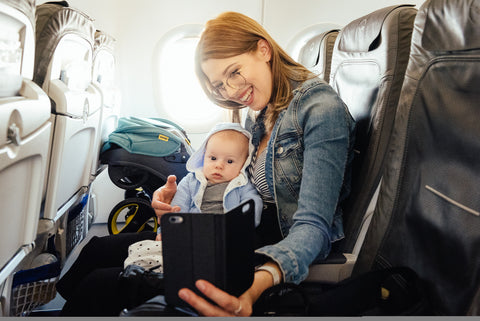Looking for something specific?
Take a look at our blog categories and get the advice and guidance you need!
Expecting Essentials
becoming a parent is one of the greatest things in life, but it can also be one of the scariest! the uncertainty of what parenthood will bring can spook anyone, but we hope to calm those nerves with a little advice from the experts.

Looking for a comfortable nursing chair for your nursery? The new Etta Faux Fur Nursing Chair by CuddleCo offers cloud-soft cushioning, gentle rocking and timeless style, designed to support UK parents through feeds, cuddles and everyday nursery moments.

We get this question a lot, so here’s a simple guide to help you choose the right fit. Both the Clara Cot Bed and Clara Mini Cot Bed adapt from a newborn cot into a toddler bed or day bed, giving you long-lasting use. The Clara Cot Bed is spacious and makes a statement in the nursery, while the Clara Mini offers the same timeless style in a compact size, ideal for smaller rooms or maximising space.

Nestled in a dedicated factory here in the UK, each CuddleCo mattress is more than just a sleep surface - it’s a labour of love, designed with safety, comfort, and sustainability in mind.

At CuddleCo, we’ve got two fabulous contenders for the title of Best Seat in the House; meet the Etta and the Marley nursing chairs. They’re both stylish, snuggly, and built for comfort, but they each bring their own flair to your nursery. Let’s dive in and see which chair steals your heart…

Creating the perfect nursery is a beautiful part of preparing for a new arrival. From choosing calming colour palettes to picking out those first adorable sleepsuits, every detail matters. But one of the most important pieces you'll invest in? A safe, comfortable, and stylish cot bed that grows with your baby.

Sleep – that precious luxury. Before pregnancy, you probably drifted off without a second thought. But as your body changes, your bump grows, and new aches and worries emerge, getting a decent night’s sleep can start to feel like a distant dream.
If pregnancy insomnia, restless legs, or just plain discomfort are keeping you up at night, you’re not alone. The good news? There a plenty of ways to create a sleep-friendly environment and wind down for the night.
Cut out screen time an hour before bed
We’re all guilty of that one-last-scroll through social media or bingeing one more episode of a favourite show. But the blue light from your phone, tablet, or TV can trick your brain into thinking it’s still daytime. This makes it harder for your body to produce melatonin, the hormone that helps you wind down and fall asleep.
Create a relaxing bedtime routine
Establishing a calming bedtime routine helps signal to your body that it’s time to wind down. Choose activities that soothe your mind and relax your body:
-
Practice mindfulness or deep breathing exercises: Apps like Calm or Headspace can guide you through gentle meditation, helping you to switch off before bed
-
Reading: Rather than opting for a screen like your phone, try reading a few pages of a lighthearted book instead
-
Self-care: A warm (but not too hot) shower can help relax tense muscles and prepare your body for sleep
Consistency is key when first establishing a bedtime routine – find what works for you and stick to it.
Invest in a pregnancy pillow
One of the biggest challenges you are likely to face when sleeping while pregnant is simply finding a comfortable position. As your bump grows, it can feel impossible to get comfy without tossing and turning.
That’s where the pregnancy pillow comes in. These lifesavers come in various shapes, from C-shaped to U-shaped, and provide support where you need it most — whether that’s under your bump, between your knees, or behind your back. Bonus? Many pregnancy pillows double as feeding or sitting supports after your baby arrives.
📷 @lifewith_jacob.lottie.nellie
Avoid caffeinated drinks in the evening
This one might sound obvious, but it’s easy to forget how much caffeine can sneak into your day. Tea, coffee, and even cola can disrupt your ability to fall asleep.
During pregnancy, it’s recommended to limit your caffeine intake to no more than 200mg per day. Save your caffeinated drink for the morning and switch to decaf options as the day winds down.

Stay active during your pregnancy
Keeping active will help you stay fit and well during your pregnancy. Gentle exercise during the day may also help you sleep better at night.
Consider these bump-friendly activities:
-
Walking: A brief stroll outside in the fresh air can help clear your mind and improve your mood
-
Antenatal yoga or pilates: Antenatal classes are a great way to meet other parents-to-be, just make sure the instructor knows you’re pregnant
It’s important to listen to your body and avoid pushing yourself too hard during physical activity. Speak to your GP or midwife for more advice about exercising while pregnant.
Pregnancy might bring its fair share of sleep challenges, but with a few mindful adjustments, you can create a sleep routine that works for you. Be kind to yourself — some nights will be better than others, and that’s okay.
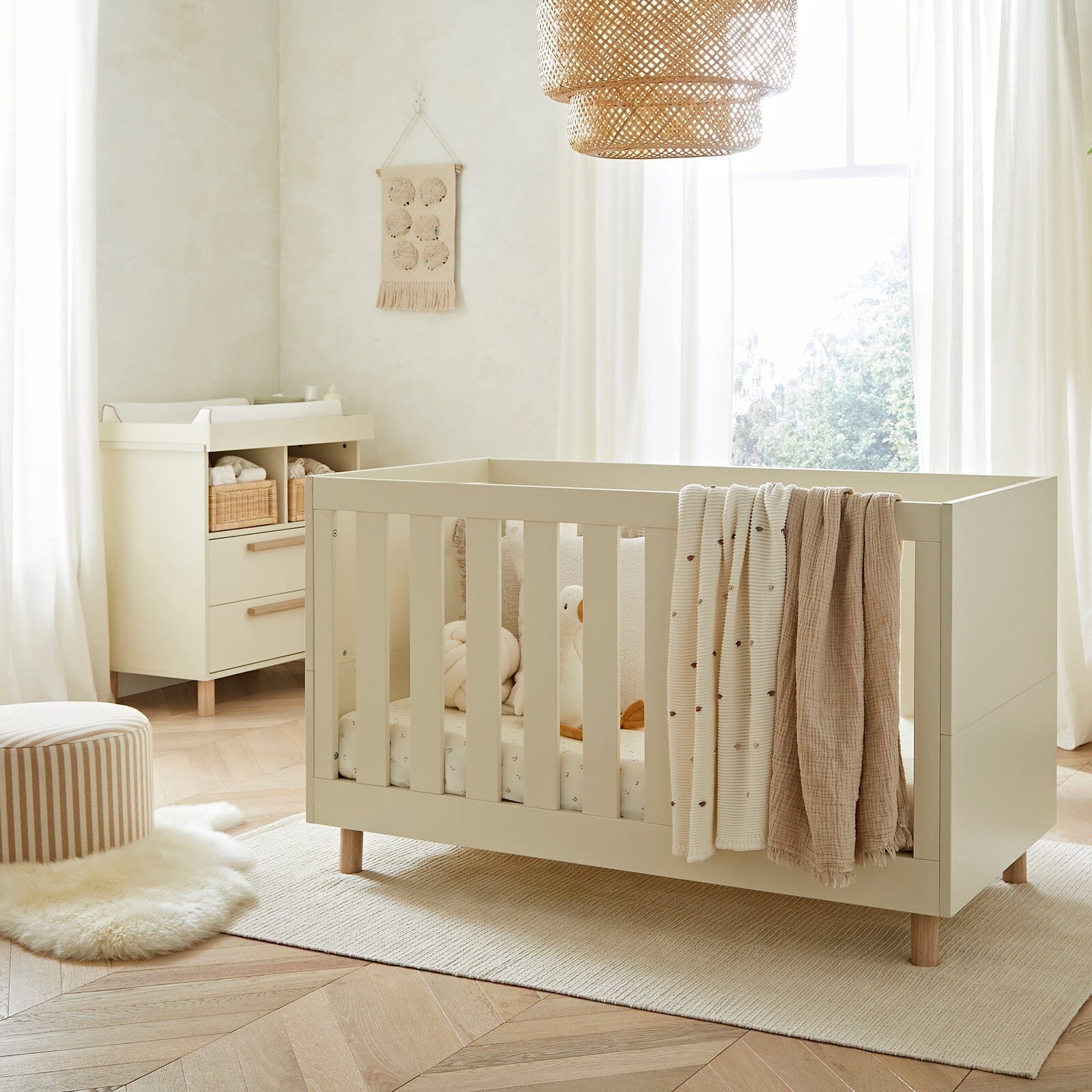
Welcoming a new baby into the world is one of the most amazing experiences in life. As you prepare to meet your little one, the countdown to their arrival can feel equal parts exciting and overwhelming.
Preparation ahead of your baby’s arrival is important to help ease the transition into parenthood, and luckily for you, there are lots of tools and resources to help you prepare during your pregnancy.
Whether it’s your first baby or you’re adding to your family, here are 10 essential things to do before your baby arrives to ensure you’re ready for their debut.
Create a birth plan
A birth plan is personal to you and contains all the details of what you would like to happen during your labour, birth, and after birth. If you would like to create a birth plan your midwife can help you. Things to think about are:
-
Your birthing options (hospital, in a midwifery unit, or at home)
-
Decide on your preferences for pain relief, labour positions, and who you would like to support you at your birth
-
Be flexible – things may not go exactly as planned
Take antenatal classes
Antenatal classes are a great way to prepare for birth and the arrival of your baby. Places in antenatal classes can get booked up quickly. So be sure to look into these early in your pregnancy to avoid disappointment.
-
Antenatal classes are free on the NHS – to find out about classes near you, ask your midwife, health visitor or GP
-
Include your partner or the person who will be supporting you during your birth for shared preparation
Set up the nursery
Designing the nursery for your new baby is super-exciting, but it can be hard to know where to start. Lots of parents-to-be like to start a Pinterest board dedicated to their baby’s nursery to allow them to start collating ideas and inspiration.
-
Make sure you choose quality, long-lasting nursery furniture that grows with your baby
-
Don’t forget to measure your space before placing any furniture orders
-
Remember you’ll also be spending lots of time in the nursery too, so make sure it’s a calm and cosy space for you both
Stock up on baby essentials
Baby’s might be small, but they require lots of things to keep them happy, healthy and nurtured. Things like nappies, muslins, and sleepsuits are things you will get through quickly, so start building your collection early on.
-
If you’re planning on having a baby shower you could create a list of things you need, meaning you don’t get bought duplicates or things you don’t necessarily need
-
Keep an eye out for baby events online and in-store, stock up while things are discounted or on sale
Make your home baby safe
If you’re a first-time parent, babyproofing your home will be completely new to you. But, to put it simple, it essentially means removing anything from your home that can cause harm to your baby. Some things to consider are:
-
If you live in a house with stairs, consider installing safety gates if needed
-
Keep all small objects out of reach
-
Purchase a children’s first aid kit
Take time for yourself
In the run-up to your due date, make sure to prioritise time for yourself. Whether that’s relaxing and catching up on a TV show or eating out at your favourite restaurant.
-
Treat yourself to activities you enjoy while you have the time
-
Take a babymoon or enjoy date nights
-
Rest and recharge – parenting will soon demand plenty of energy!
Pack your hospital bag
At least 3 weeks before your due date, or earlier if you can, you should have your hospital bag packed and ready to go. Your hospital bag should include everything you need for labour, birth and after birth, and of course, everything your baby will need.
-
Don’t forget to pack your birth plan and hospital notes
-
Be sure to take your phone charger – you could be there for a while
-
Double check items specific to your hospital or birthing centre requirements
Prepare older siblings or pets for a new baby
Welcoming a new baby affects the entire household, and preparing older siblings or pets can help ensure a smooth transition:
-
If you already have children, make sure you talk to them about the baby using age-appropriate language to explain what’s happening and what to expect. Share books or videos about becoming an older brother or sister
-
Plan quality time with your older child before and after the baby arrives
-
When the baby arrives, introduce them to your pet calmly and under supervision
Build your support system
When your little one arrives, you will soon realise how important it is to have family and friends you can reach out to for a helping hand. Whether that’s picking you up a few essentials from the supermarket or looking after your baby for an hour while you get some rest.
-
Identify friends and family who can help you after your baby arrives
-
Join parenting groups or online communities for advice
-
Schedule time for your partner or other children to feel included
Plan for postpartum recovery
The first 6 weeks after giving birth are know as the postpartum period. During this time, it is important to look after yourself and prioritise healing. Don’t be afraid to ask for help from your partner or loved ones.
-
Stock up on postpartum care items like maternity pads, and if you’re planning on breastfeeding, nipple pads and cream. A nursing pillow will also come in handy during your recovery
-
Ask friends and family to bring you a home cooked meal when they visit, rather than a gift
-
Don’t be afraid to communicate your needs with your support network
Preparation is key when expecting a baby but remember to also enjoy this special time. Life is about to change in the most wonderful way—cherish every moment leading up to your little one’s arrival in 2025!

World Breastfeeding Week is a worldwide celebration held in the first week of August every year, and this year’s theme is Closing the gap: Breastfeeding support for all.
This year’s campaign is all about recognising breastfeeding mums, ensuring they’re seen and heard, as well as sharing relatable, genuine experiences about breastfeeding and the importance of multi-level support.
Thinking about breastfeeding?
If you’re pregnant you may already be considering breastfeeding your baby when they’re born, or maybe you’ve already decided that you want to breastfeed, either way it’s good to find out as much as you can about breastfeeding before your little one arrives.
Speaking to your midwife is a great place to start. You might even want to ask family and friends about their experiences breastfeeding. The NHS also has lots of helpful information and support available on their website and can recommend useful helplines and online resources.
Benefits of breastfeeding
Breastfeeding is a great way to bond with your baby when they’re born and has multiple health benefits for them.
According to the NHS, some of the benefits of breastfeeding are:
- Your breast milk meets all of your baby’s nutritional needs
- Breast milk protects your baby from infections and diseases
- Breastfeeding provides health benefits for you
- Breast milk is available for your baby whenever your baby needs it
- Breastfeeding can build a strong emotional bond between you and your baby
How to breastfeed
The NHS website covers the main aspects of breastfeeding such as latching on and signs your baby is ready to feed. But you may also want to attend antenatal classes while you’re pregnant to find out more about breastfeeding, how to tackle common breastfeeding problems, and you will also have the opportunity to meet other expectant mums that are in the same position as you.
Breastfeeding support
You may be worried about breastfeeding your baby for the first time, how they’ll latch on, or if you will know when it’s time to feed.
These concerns are completely normal. Breastfeeding is a skill that takes time to get the hang of, so be kind to yourself and trust your natural mum instinct. Be patient, everyone’s feeding journey is different, and what works for one person might not necessarily work for you.
Remember, breastfeeding isn’t the only option, so don’t be hard on yourself if things don’t go to plan.
You can always speak to your midwife, health visitor or GP about any concerns you have about breastfeeding.
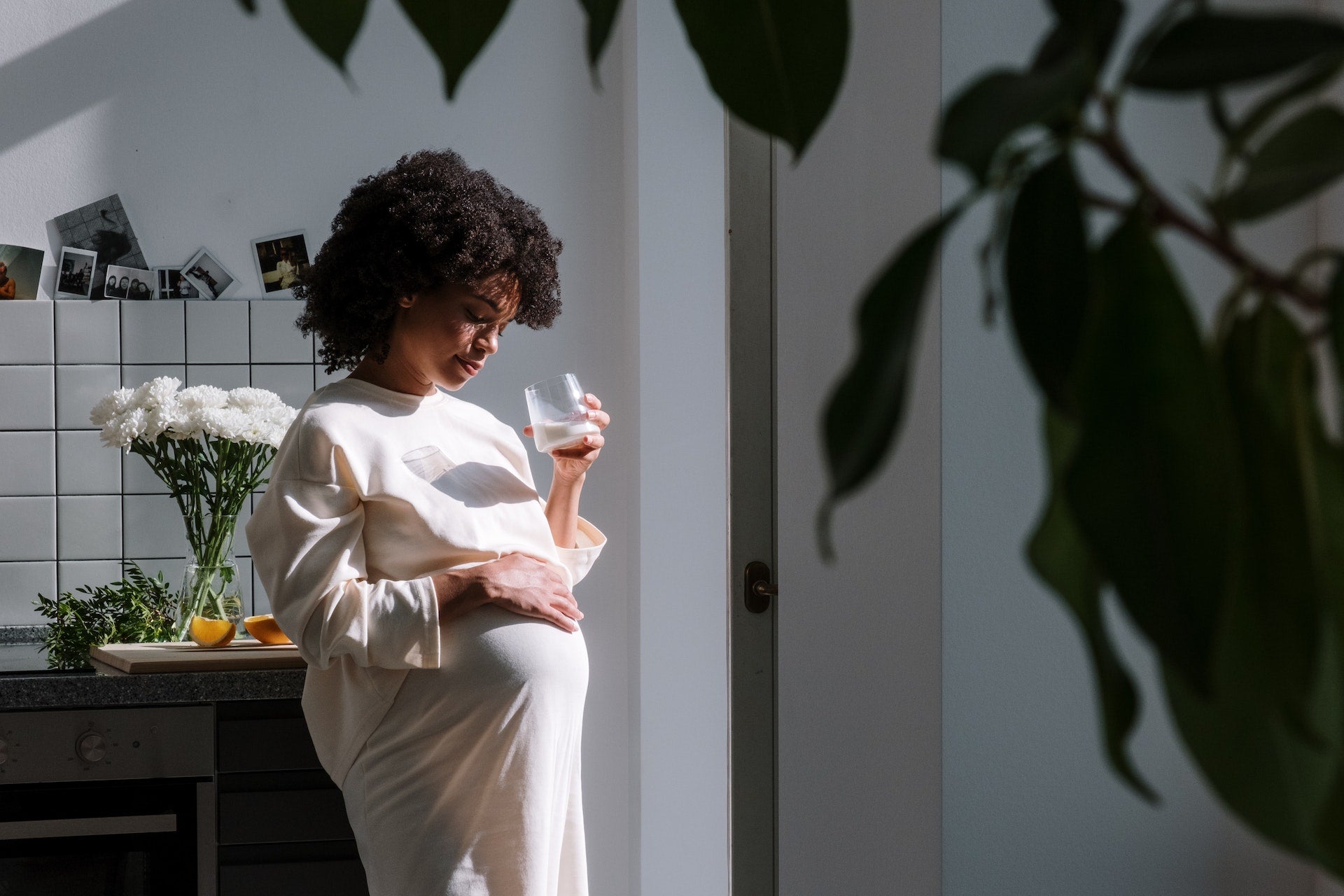
Having a healthy, balanced diet during pregnancy is important for both you and your baby. By eating a varied diet, you can ensure that you’re getting the nutrients you both need to help your baby grow and develop.
Eat Well Guide
A healthy diet doesn’t necessarily mean cutting out all your favourite foods. But instead, changing the number of different foods you eat to achieve a varied diet. The NHS Eat Well Guide makes it easy to understand how much of what you eat should come from each food group.
Cooking a balanced, nutritional meal may be the last thing on your mind when pregnant. Especially during your first trimester, when you may be experiencing sickness or tiredness.
But not to worry, as you don’t have to achieve the right balance in every meal. The NHS states that you should aim to get the balance right over the course of the week.
Myth-busting
A common myth you’ll hear while pregnant is that you’re now ‘eating for two’. However, when you’re pregnant, you don’t need to have larger portions or extra food. The best way to ensure your baby is getting the essential nutrients they need to develop is by trying to achieve a healthy, balanced diet.
It's normal to have an increased appetite during your pregnancy. According to BabyCenter, the reason you feel hungrier is due to changes in your hormones. They explain that even though you may feel ravenous, you don’t actually need any extra calories. It’s only in the third trimester that you need an extra 200 calories a day.

Fruit and Vegetables
Fruit and vegetables are full of vitamins and minerals as well as fibre, which can help prevent constipation. They also release energy slowly, so you feel fuller for longer.
Therefore, you should eat at least 5 portions of fruit and vegetables a day. These can be in the form of fresh, canned or frozen fruit and vegetables. When shopping for canned fruit and vegetables, you should opt for those that are tinned, in natural juice or water, with no added salt or sugar.
Remember to always wash fresh fruit and vegetables.
For more information on what counts as one of your 5 A Day, visit the Eat Well guide.

Important Vitamins and Minerals in Pregnancy
A healthy, varied diet should help you get most of the vitamins and minerals you need during pregnancy. However, the NHS recommends pregnant women to take a folic acid supplement and a vitamin D supplement.
Folic Acid
Start taking folic acid as soon as you begin trying for a baby or as soon as you find out you're pregnant. The NHS advise you to take a folic acid supplement that contains 400 micrograms (mcg) every day until the end of your first trimester. It’s important to follow this advice as folic acid can prevent neural tube defects such as spina bifida.
Vitamin D
Vitamin D is essential for healthy bones and muscles. During autumn and winter (between October and early March), the lack of sunlight means we cannot make the vitamin D we need. Therefore, you should consider taking a daily vitamin D supplement containing 10mcg.
Vitamins You Should Avoid
During your pregnancy, you should avoid supplements and multivitamins containing vitamin A (retinol). Too much vitamin A can harm your baby’s development. This also includes liver products such as fish liver oil.
If you’re unsure or have any doubts about vitamins and supplements. We recommend speaking to a healthcare professional.
Food and Drink to Avoid During Pregnancy
There are certain food and drink you should avoid while you’re pregnant. Some are more obvious than others, like alcohol. But others may surprise you.
Below is a condensed list of food and drink you should avoid:
- Raw or undercooked meat
- Game meats such as partridge
- All types of pâte
- Liver and liver products
- Raw shellfish
- Shark
- Swordfish
- Marlin
- Unpasteurised milk and dairy products
- Mould-ripened soft cheeses (unless cooked until steaming hot)
- Soft blue cheeses (unless cooked until steaming hot)
- Soft goats’ cheese (unless cooked until steaming hot)
- Raw or undercooked eggs that aren’t British Lion eggs
- Alcohol
- More than 200 mg of caffeine per day
We suggest you ask your GP or midwife for a full list of food and drink you should avoid while pregnant.
A Happy, Healthy Pregnancy
The most important thing to remember during your pregnancy is to eat a variety of foods to help achieve a balanced diet. Healthy eating doesn’t have to feel like a chore.
Remember, you can still enjoy your favourite foods. But just keep in mind that if sugary food and drinks are your favourite treats. You need to have these less often and in small amounts.
For further advice and guidance, speak to your doctor or midwife. Before making any changes to your diet, make sure you speak to a healthcare professional.

Your baby won’t stay so small forever, and before you know it, your baby will be crawling from one end of the room to the other. Its a good idea to start thinking about potential dangers in your home before they get to this stage. The babyproofing process is important to avoid any unnecessary accidents to keep your little one safe.
What is Babyproofing?
If you are a first-time mum, babyproofing your home will be a whole new experience for you. Unfortunately, it isn’t one of the most exciting parts of becoming a mum. In fact, it can be quite stressful. This is why preparation is essential.
Babyproofing your home simply means removing anything that can cause harm to your baby and taking precautions to make your home a safe place.

Where to Start?
The best way to babyproof your home is to look at each room in your house through the eyes of your baby. We recommend you go into each room and get on your hands and knees as if you were crawling like your baby. Take into consideration what is within easy reach, sharp edges and any furniture they may use to help them stand up. As crazy as this sounds, it will give you a ‘tots-eye-view’ of each room.
When is the best time to Babyproof a Home?
When your baby arrives, you will be occupied with feeding, changing and settling them into their new routine. So we recommend doing the majority of child proofing before they arrive. During pregnancy, most women find the second trimester a lot easier than the first. Therefore, you may find this the best time to start.

Safety around the House
Multiple babyproofing tips can be applied to all rooms of your house. You may want to start with these first.
-
Keep all small objects out of reach – make sure that there aren’t any loose change, buttons or button batteries within reach of your baby. Check down the sides of your sofa and the floor to be sure you have removed any choking hazards.
-
Blind cords – can be a strangulation hazard if they are loose and within reach of your little one. Ensure that you tie them up, cut them shorter or use blind cord safety devices.
-
Furniture – take into consideration any furniture that could topple over if your baby was to use it to help them stand up, for example, a bookshelf or a set of chests of drawers. This type of furniture should be anchored to the wall.
-
Electrical cables – are another strangulation hazard, and your baby may be tempted to chew them. Hide any electrical cables or keep them out of reach.
-
Electric sockets – that meet British Standard 1363:1995 have an inbuilt safety system. You should avoid using socket covers as they could make your plug socket less safe.
-
Sharp edges – some furniture in your house will need corner and edge guards.
-
Cleaning products – can be harmful to your baby and need to be locked away.
-
Medicines – babies and toddlers may mistake medicine for food or sweets. Keep them away from your little one in a locked cupboard.
-
Stairs – will require baby gates at the top and bottom.
-
Doors – will need door stoppers, and some may need finger guards over the hinges.
-
Cupboards – there are many safety devices to choose from that will help keep your little one from getting into cupboards and draws.
Baby and You
Before your baby can crawl or walk, you will spend a lot of time carrying them around in your arms, especially in the first few weeks when skin-to-skin contact is advised. And your baby is comforted by being close to you.
It is important there are no trip hazards on the floor. And you are always aware of your surroundings. Remember, you won’t be able to do day-to-day things like making a hot drink while holding your little one.
Other Safety Tips to Consider
-
Fitting smoke detectors
-
Purchasing a children’s first aid kit
-
Taking first aid training and downloading an app to use at home
-
Don’t leave windows open or unlocked
-
If you have a fireplace, make sure it is babyproofed
-
Ensure houseplants aren’t poisonous
Don’t Forget
Your child should always be supervised by yourself or another responsible adult.
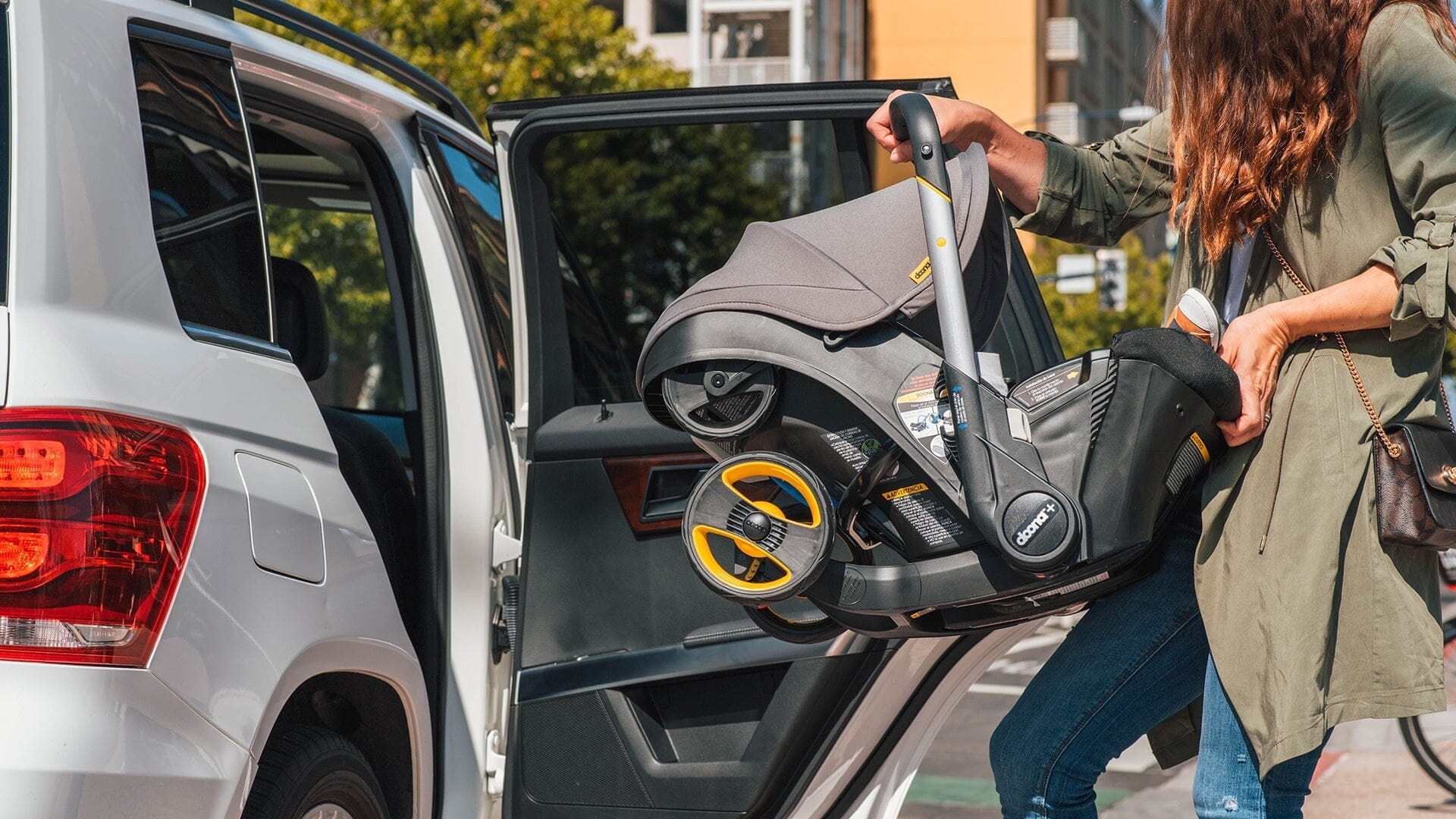
As part of Child Safety Week, we are looking at car seat safety, concentrating on the different factors you should consider when shopping for a child-safe car seat.

-
Is it TUV and FAA aircraft approved for travel?
Now that Covid restrictions have lifted. Many families will be planning their first holiday with their little ones. If you are considering travelling abroad this summer, you have probably already contemplated taking your baby’s car seat. However, you may not have checked whether its TUV and FAA aircraft approved for travel.
You can check this by simply looking for the label on your car seat. It should read, “This restraint is certified for use in motor vehicles and aircraft”.
Even if it is TUV and FAA approved, you should still contact the airline to ensure its okay.
-
Don’t buy a second-hand car seat
You may currently be preparing for the arrival of your baby and shopping for the essentials you will need to keep your little one safe, comfortable and happy. One staple you’ll need is a car seat. The NHS recommends not buying a second-hand model as it could have been damaged in an accident. It also may not have all its original parts or instructions.
-
Do you need a car seat that is part of a travel system?
There are many different models, designs and styles available. But knowing the difference between them can be difficult, especially when you want the best for your baby.
One term you may come across when searching for a car seat is ‘travel system.’ Most travel systems contain a pushchair alongside a compatible Group 0+ car seat. Although, some do come with a carrycot as well as other accessories. These are popular with parents that are on the go and want a car seat and stroller in one. To fit in with their busy lifestyles.
-
Is your car seat EU-approved?
In the UK, there are two different types of car seats you can purchase – height-based seats and weight-based seats. Below you will find the requirements for each.
Height-based seats – As stated on the gov.uk website, only EU-approved height-based child car seats can be used in the UK. These have a label showing a capital ‘E’ in a circle and ‘R129’.
Weight-based seats – As stated on the gov.uk website, only EU-approved weight-based child car seats can be used in the UK. These have a label showing a capital ‘E’ in a circle and ‘ECE R44’.
-
Does your car have ISOFIX connectors?
An ISOFIX base makes fitting your baby’s car seat easier. But, more importantly, ensures that it is secured correctly.
Most new cars have ISOFIX connectors. However, if you are unsure. You can usually find them hidden between the padding of your car’s seats. Alternatively, you can check your car’s handbook.
-
Will you be using the seat in any other vehicle?
Having time away from your baby when they first arrive is unlikely to cross your mind. Your first few weeks together are a precious time for bonding and trying to develop a new routine. But at some point, you will feel ready to leave your baby with their grandparents or a friend.
Therefore, when shopping for a car seat, you will need to keep this in mind. It will not only need to fit your car. But also family and friends who will be looking after your child.
-
How long can a baby stay in a car seat?
It is important to remember that car seats are designed to keep babies safe while travelling and not as somewhere for them to sleep when outside of the car. The Lullaby Trust recommends that babies should not be in a car seat for longer than 2 hours at a time. And they should be taken out frequently.
They also advise that when travelling in a car with an infant, an adult should be sat in the back of the car with them to ensure they’re safe
and comfortable.


-
The benefits of a rear-facing car seat
Ultimately, rear-facing car seats are much-safer and offer better protection than forward-facing car seats. It’s also a legal requirement for children under 15 months to travel rear-facing.
-
Practice fitting the seat before your baby is born
Leaving the hospital to return home for the first time with your new arrival is a special moment for all parents. You will be filled with a range of emotions, ranging from excitement to nerves. It’s completely normal to feel nervous or anxious about the start of your new journey with your little one.
One thing that you don’t want to have to worry about when leaving the hospital or birth centre is fitting your baby’s car seat for the first time.
-
Babies are more vulnerable to injury than adults
When choosing a car seat for your baby, their safety should be at the forefront of your mind. Babies need protection that adults don’t. This is because of their physical traits, such as their proportions.
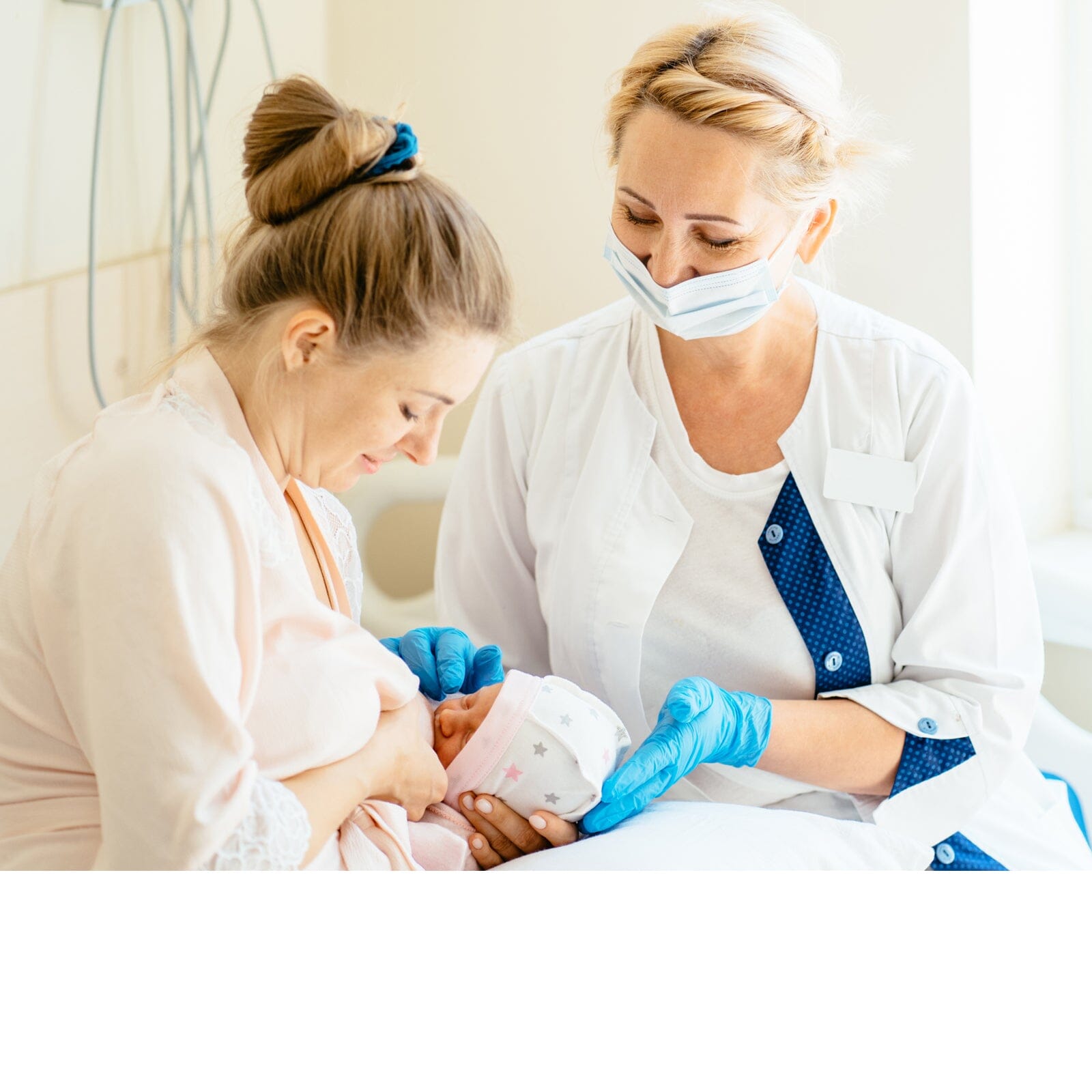
Nursing pillows can sometimes get forgotten about in the never-ending list of things you need to purchase before the arrival of your baby. Although they are not deemed an essential for mums-to-be, they are definitely a useful product to help you and baby feel more comfortable during feeding.
What is a Nursing Pillow?
A nursing pillow, also known as a breastfeeding pillow, is a C shaped or U shaped pillow that supports you and your baby during breastfeeding or bottle feeding. They wrap comfortably around your body, adapting to your shape and providing a safe place for your baby to rest as they feed. You will find them in a range of prints and styles. But essentially, they are all designed to help make nursing easier and to reduce neck, arm and back strain for you.
Our Mother&Baby Feeding & Infant Support Pillow
Can I use a Feeding Pillow After a C-Section?
A caesarean birth might make breastfeeding more difficult due to several reasons, such as loss of mobility or a long and stressful labour. However, with extra support from your midwife, you should be able to find a breastfeeding position that is comfortable for you. One position that the NCT recommends is the ruby-ball or underarm position, as it might help keep your baby away from your scar. They further suggested that you may want to place a pillow under your arm to help support your baby's weight after they have latched on. Other C-section friendly positions they advise are lying down on your side and laid-back breastfeeding.

Why Should I Buy a Nursing Pillow?
Nursing pillows are especially handy if you plan on breastfeeding your baby. Lactation consultant Wendy Wisner advises keeping baby close with skin-to-skin contact during the first few days of breastfeeding. She explained, “This way, anytime your baby looks for the breast, it will be right there. Rooting, head bobbing, fist sucking, mouth fluttering—these are all signs your baby is hungry.”
Trying to maintain skin-to-skin contact for long periods of time can become tiring for your arms. You may find it even more uncomfortable if you have had a caesarean. Therefore, having a breastfeeding pillow to help support the weight of your baby can make the experience more enjoyable for the both of you.
What if I’m Expecting Twins?
If you are expecting twins and want to breastfeed them, you may want to consider tandem feeding. For this, a twin feeding pillow will help you and your babies find the perfect latch position.

Things to Consider When Choosing a Nursing Pillow
- Is it washable? – It is worth considering whether the pillow itself is washable or if it comes with a removable cover that can be washed.
- Does it have a certified organic cotton cover? – To avoid your baby’s sensitive skin encountering any nasty chemicals or dyes, you will need to ensure that the cover is GOTS certified (Global Organic Textiles Standard).
- The shape – As we mentioned earlier, most nursing pillows are either C shaped or U shaped. Before your baby arrives, we recommend shopping around and trying each shape to find the most comfortable pillow.
- Is it adjustable? – Many feeding pillows are adjustable and feature a strap or belt to secure the pillow around your waist.
Support Pillows and Your Growing Baby
You can continue to use most feeding pillows as your baby grows to help them with their key development stages. The pillows can be used to support baby with tummy time and sitting up. The NHS advises to only do tummy time when your baby is awake and alert. You should never leave your baby on their own propped up by a nursing pillow.
check out our latest articles
Christmas Gift Guide: Thoughtful Gifts Under £50
Choosing Christmas gifts for babies, toddlers and expectant mums can feel overwhelming, especially when you want something practical, beautiful...
read moreWhy Convert Your Cot Bed into a Toddler Bed?
When you’re choosing nursery furniture, you want pieces that feel timeless and last beyond the baby stage. That’s exactly what a cot bed offers,...
read moreOne name, two sizes – what’s the difference?
We get this question a lot, so we've put together a simple guide to help you choose the right fit for your space. Parents often ask us about the di...
read moreGetting Ready for Baby: The New CuddleCo Nursery Essentials Collection
Preparing your baby’s nursery is one of those special parts of pregnancy. From setting up the cot to folding tiny clothes, every detail helps you...
read moreHow to Convert Your Cot Bed into a Toddler Bed
Turning your cot bed into a toddler bed marks an important moment in your child’s development - and with CuddleCo, it’s easy to do. (Applies...
read moreOur New Nursery Essentials Collection
The nursery is more than just a room, it’s where you and your baby will share so many firsts, from sleepy cuddles to playful mornings. The right...
read moreEtta vs. Marley: The Ultimate Nursing Chair Showdown
Spoiler alert: everyone wins (especially you and baby). When it comes to setting up your nursery, there’s one hero piece that often gets overlooked...
read moreA Sleep Solution That Grows With Your Family: Discover CuddleCo’s Cot Beds
Creating the perfect nursery is a beautiful part of preparing for a new arrival. From choosing calming colour palettes to picking out those first...
read moreMeet Shush Consultancy – Certified Child Sleep Consultant
Whether you're in the thick of sleepless nights or just looking to create healthy sleep habits, these gentle, practical suggestions are designed ...
read more


